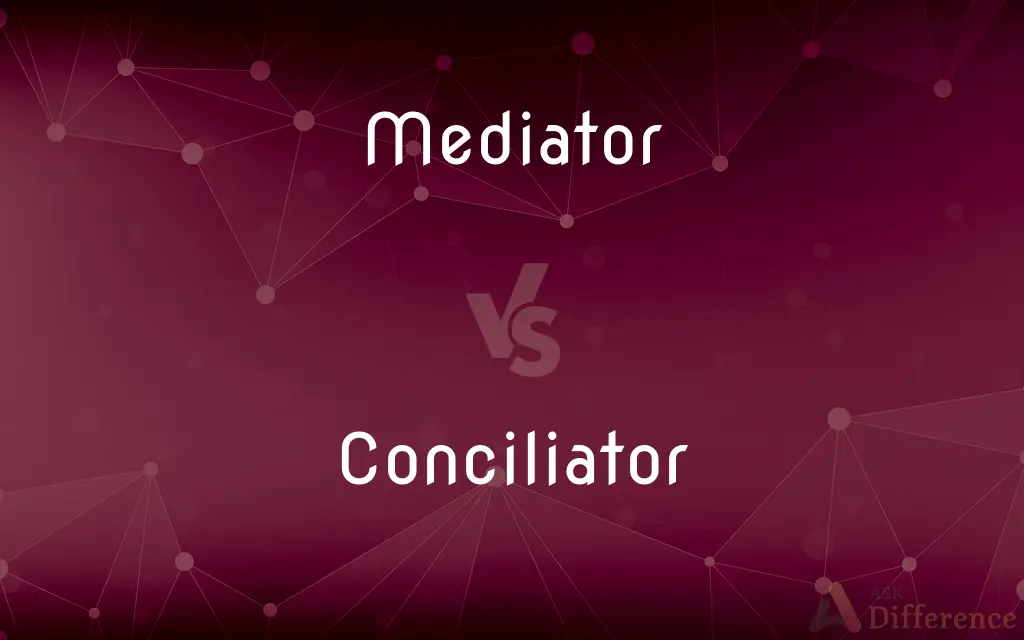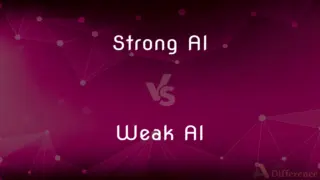Mediator vs. Conciliator — What's the Difference?
By Tayyaba Rehman & Maham Liaqat — Published on November 1, 2024
A mediator helps disputing parties find a mutually acceptable solution, while a conciliator actively advises and suggests solutions to resolve a conflict.

Difference Between Mediator and Conciliator
Table of Contents
ADVERTISEMENT
Key Differences
Mediators play a neutral role in facilitating dialogue between parties in a dispute, encouraging them to communicate openly and work towards a mutually acceptable resolution. The mediator's primary function is to ensure a structured and efficient negotiation process, without imposing their own opinions or solutions. On the other hand, a conciliator takes a more hands-on approach, often proposing solutions, offering advice, and guiding the parties towards a settlement. While conciliators also maintain neutrality, they are more likely to suggest options and provide their own insights into the resolution of the conflict.
The process led by a mediator is often characterized by joint and separate sessions with the disputing parties, focusing on uncovering underlying interests and exploring potential resolutions collaboratively. Mediators assist the parties in understanding each other's perspectives and work towards creating a conducive environment for negotiation. Conversely, conciliation involves a more advisory role, with the conciliator actively participating in the discussions, sometimes even meeting parties separately to identify possible solutions and build a settlement proposal.
In mediation, the control over the outcome remains largely with the disputing parties; the mediator facilitates the process but does not contribute to the content of the agreement. The parties retain the power to agree or disagree with the proposals that arise during mediation. In contrast, during conciliation, the conciliator's suggestions and guidance can significantly influence the final agreement. While the parties still ultimately decide, the conciliator's active involvement in proposing solutions means their influence on the outcome is more pronounced.
The choice between mediation and conciliation often depends on the nature of the dispute and the preferences of the parties involved. Mediation might be preferred in situations where parties are willing to communicate directly and seek a facilitator to structure the dialogue. Conciliation may be more suitable for disputes where parties benefit from expert advice and are open to receiving proposed solutions from a neutral third party.
The outcome of mediation is typically a mutually agreed upon resolution, crafted and accepted by all parties involved. This collaborative process aims to ensure that the agreement is sustainable and satisfactory to everyone. On the other hand, the outcome of conciliation might reflect more of the conciliator's input, as they play a more active role in shaping the final agreement with their suggestions and advice.
ADVERTISEMENT
Comparison Chart
Role
Facilitates communication and negotiation
Provides advice and suggests solutions
Approach
Neutral and non-directive
More directive and advisory
Control over Outcome
Parties retain control over the outcome
Conciliator's suggestions influence outcome
Process
Focuses on structured dialogue
May involve offering solutions
Nature of Dispute
Suitable for disputes where direct communication is desired
Preferred in disputes needing expert advice
Outcome
Mutually agreed resolution by parties
Agreement may reflect conciliator's input
Compare with Definitions
Mediator
Maintains a neutral stance without offering solutions.
Despite the complexity of the issue, the mediator remained neutral throughout the process.
Conciliator
Actively advises and suggests solutions.
The conciliator proposed several viable solutions to address the dispute.
Mediator
Facilitates a structured negotiation process.
Through the mediator's guidance, both parties felt heard and respected.
Conciliator
Takes a more hands-on approach in the process.
With the conciliator's involvement, the discussions were more focused and productive.
Mediator
Assists parties in reaching their own agreement.
The mediator helped them communicate more effectively to resolve their dispute.
Conciliator
Influences the final agreement with their input.
The agreement reflected some of the key solutions suggested by the conciliator.
Mediator
Helps uncover underlying interests.
The mediator was instrumental in identifying the core issues at hand.
Conciliator
Preferred for disputes needing expert advice.
Given the technical nature of the dispute, a conciliator's expertise was invaluable.
Mediator
Ensures parties retain control over the outcome.
The final decision was entirely up to the parties, thanks to the mediator's approach.
Conciliator
May propose a settlement proposal.
The conciliator drafted a comprehensive settlement proposal that was eventually accepted by both parties.
Mediator
One that mediates, especially one that reconciles differences between disputants.
Conciliator
To overcome the distrust or animosity of; appease.
Mediator
(Physiology) A substance or structure that mediates a specific response in a bodily tissue.
Conciliator
To regain or try to regain (friendship or goodwill) by pleasant behavior.
Mediator
(Physics) A subatomic particle that effects or conveys a force between subatomic particles.
Conciliator
To make or attempt to make compatible; reconcile
Tried to conciliate the conflicting theories.
Mediator
One who negotiates between parties seeking mutual agreement.
Conciliator
To gain or try to gain someone's friendship or goodwill.
Mediator
A chemical substance transmitting information to a targeted cell.
Conciliator
A person who conciliates
Mediator
One who mediates; especially, one who interposes between parties at variance for the purpose of reconciling them; hence, an intercessor.
For there is one God, and one mediator between God and men, the man Christ Jesus.
Conciliator
One who conciliates.
Mediator
A negotiator who acts as a link between parties
Conciliator
Someone who tries to bring peace
Common Curiosities
In what situation might conciliation be preferred over mediation?
Conciliation might be preferred in disputes where parties could benefit from expert advice or when a more directive approach to suggest solutions is desired.
How does the control over the outcome differ between mediation and conciliation?
In mediation, the disputing parties retain full control over the outcome, crafting and agreeing upon the resolution themselves. In conciliation, while the final decision still rests with the parties, the conciliator's suggestions can significantly influence the agreement.
What is the primary role of a mediator in a dispute?
A mediator facilitates communication and negotiation between disputing parties, helping them to reach a mutually acceptable solution without providing personal opinions or solutions.
How does a conciliator's approach differ from a mediator's?
A conciliator plays a more advisory role, often suggesting solutions and offering advice to guide the parties towards a settlement, whereas a mediator focuses on facilitating dialogue without directing the outcome.
How does a conciliator differ from a mediator?
A conciliator actively advises and suggests solutions to the parties, whereas a mediator primarily facilitates dialogue without proposing solutions.
What is the role of a mediator in dispute resolution?
A mediator facilitates communication between disputing parties to help them reach a mutually acceptable agreement.
Are conciliators more involved in the outcome of a dispute?
Yes, conciliators may take a more active role in shaping the resolution by providing advice and suggesting terms for settlement.
Can mediators make decisions for the parties involved?
No, mediators cannot make decisions; their role is to assist the parties in finding their own resolution.
Can mediators propose solutions to disputes?
Mediators generally do not propose solutions; their role is to facilitate communication so the parties can generate their own solutions.
Can either mediation or conciliation be legally binding?
The agreements reached can be made legally binding if all parties agree and formalize the terms, typically through a contract or court order.
Is confidentiality maintained in both mediation and conciliation processes?
Yes, both processes are confidential, protecting the privacy of the discussions and any agreements reached.
How do the costs compare between using a mediator and a conciliator?
Costs can vary widely depending on the professionals involved and the complexity of the dispute, but both methods generally aim to be cost-effective alternatives to litigation.
Can mediation or conciliation be used in any type of dispute?
These methods are versatile and can be applied in many types of disputes, including commercial, family, and workplace conflicts, but may not be suitable for all situations, particularly where legal rights or criminal matters are involved.
Is it necessary for mediators and conciliators to have a legal background?
Not necessarily, though many have legal or relevant professional experience; their effectiveness relies more on their skills in negotiation, communication, and conflict resolution.
How long do mediation and conciliation processes typically take?
The duration can vary greatly depending on the complexity of the dispute and the willingness of the parties to cooperate, but both methods aim to be quicker than going to court.
Share Your Discovery

Previous Comparison
Strong AI vs. Weak AIAuthor Spotlight
Written by
Tayyaba RehmanTayyaba Rehman is a distinguished writer, currently serving as a primary contributor to askdifference.com. As a researcher in semantics and etymology, Tayyaba's passion for the complexity of languages and their distinctions has found a perfect home on the platform. Tayyaba delves into the intricacies of language, distinguishing between commonly confused words and phrases, thereby providing clarity for readers worldwide.
Co-written by
Maham Liaqat












































